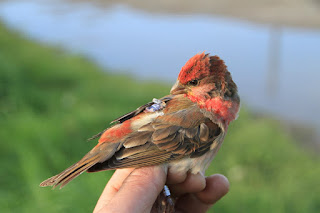During seasonal migration, birds typically travel between breeding and non-breeding grounds. Migratory routes form major flyways, such as the Indo-European flyway between Europe and the Indian subcontinent. So, responding to seasonal changes, there are distinct bird migration strategies. In the autumn, the strategy is energy-saving, driven by resource availability. In spring, it is time-saving, driven by wind conditions.

In a new study published in the Journal of Biogeography, investigators tracked birds in flight to identify potential barriers to migration and fight corridors. The birds’ adaptive behaviours helped with navigation along the route.
Mapping the flight paths in the sky
Using lightweight global navigation sensors to track rosefinches (Carpodacus erythrinus) from five breeding populations, factors influencing bird migration strategies were noted: wind or resources. Also, combing several studies from across Europe gave more in-depth ecological insights.
Deserts, oceans and mountains influence weather systems and resource availability, creating either passable corridors or barriers to migration. The birds must balancer risks against food availability and energy conservation. So, migratory birds have developed several behaviour options facilitating navigation across or around ecological barriers. So, a key choice is whether to cross these barriers or go around them. Taking the wrong route can be costly.
Saving engergy or saving time?
The research found two seasonally distinct bird migration strategies: energy-saving in autumn, driven by resource availability, time-saving in spring, driven by wind conditions.
“For me, the study started years ago on the coast of the German Baltic Sea. Together with two of my co-authors Roland Neumann and Benjamin Metzger, we caught and tracked Common rosefinches aiming to reveal their exact wintering locations,” said lead author Dr Simeon Lisovski of the Alfred Wegener Institute Helmholtz Centre for Polar and Marine Research in Germany.
For a related podcast, see Ecological Intelligence – from ants to birds and plants.
Writer: Ray Noble is a chartered biologist and Fellow of the Royal Society of biology.

One comment
Comments are closed.